2021 Outcomes Report (Dr. O’Donnell):
One of the Core Values of our service is measurement and transparency. Thus, every year we review all surgical cases and report these publicly. Of course, conclusions as to durability of outcome cannot be made from this report; however, the depth and breadth of surgical cases is illustrated. Moreover, complication rates are reported, but ultimate outcome is not possible with such short follow-up. 2021 was unique in terms of the impact of COVID-19 on clinical volume.
Dr. O’Donnell’s outcomes data is systematically reviewed by his Research Assistants utilizing the medical records system of Massachusetts General Hospital as well as our prospective Patient Reported Outcomes Database (SOS™, Arthrex, Naples, FL). Our methodology consisted of a review of all operations performed during the calendar year on a case-by-case basis, with special consideration made to procedure type, patient past surgical history (primary vs. revision status), and any complications arising during or after an operation. This data was collected, aggregated, and independently analyzed by the two Research Assistants with no direct input from the attending physician.
Physician Overview for the Year 2021
- 146 surgeries were performed throughout the year 2021
- Of these 146 operations, 125 were primary surgeries. Additionally, 0 were revisions of his own past cases (these revisions were performed in the 2021 calendar year, but the primary operation could be from prior years), and 21* were revisions of other surgeons’ cases.
2021 Surgeries Organized by type:
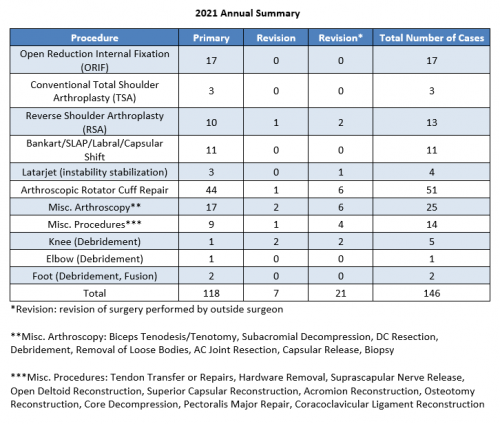
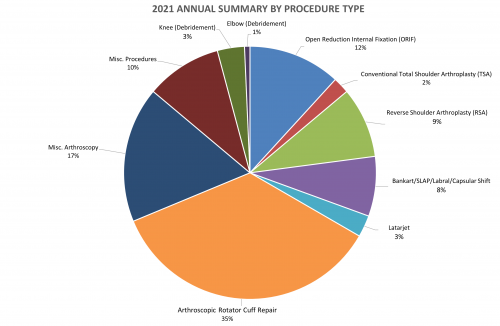
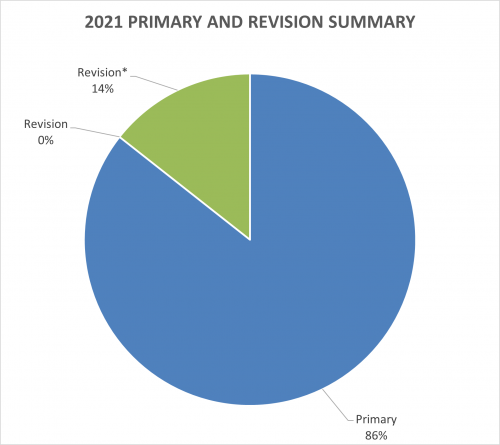
*Revision (green portion of above graph): revision of surgery performed by outside surgeon
2021 Surgical Complications
Reported below are all of Dr. O’Donnell’s complications during the 2021 calendar year. Of the 146 surgeries performed by Dr. Warner, 3 patients (2.0%) experienced a complication. These complications were identified in the calendar year 2021, but the primary operation could have occurred in prior years. Please see the data depicted below. Of note, nerve issues constitutes the most prominent complication.
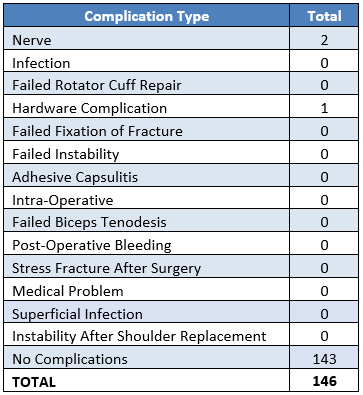
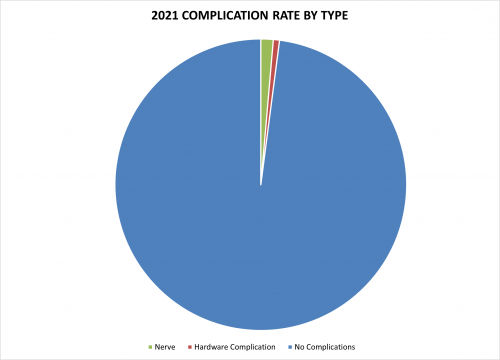
Management of Complications
Of all 146 surgeries in 2020, 1 case (0.7%) had to be readmitted to the hospital for an additional operation. In the spirit of transparency and accountability, the Boston Shoulder Institute is providing details for each complication. This will enable patients to be fully informed as to risks of surgery. Each of Dr. O’Donnell’s 2021 complications is detailed below, along with whether it is resolved or ongoing.
Of the 3 total cases, 0 have fully recovered and 3 have an ongoing problem. These are shown below in Green (recovered) and Red (not fully recovered).
A detailed recount of the readmissions follows:
- Nerve
- A week following a distal clavicle excision and arthroscopic biceps tenodesis, the patient developed persistent pain in the radial forearm. They were diagnosed with a distal nerve injury, likely from the sling or swelling in the forearm. Three months after surgery, the patient underwent neurolysis and forearm decompression. Pain persisted and the patient is continuing to be monitored.
Itemized details for the remaining complications that did not require readmission are as follows:
- Nerve
- Two weeks following a reverse total shoulder arthroplasty and open reduction and internal fixation of the acromion, the patient experienced swelling in the arm with no evidence of a blood clot. Six weeks after the procedure, the patient continued to experience swelling and developed weakness in her hand, likely due to swelling on the median nerve. The patient is recovering well in regard to their shoulder. The patient is recovering appropriately, doing occupational therapy for their hand, and is continuing to be monitored.
- Hardware Complication
- Following a Latarjet procedure, the patient was doing well and returned to their very active lifestyle. However, they developed graft resorption and loosening of the inferior screw. They are currently deciding if they would like to have them arthroscopically removed.
